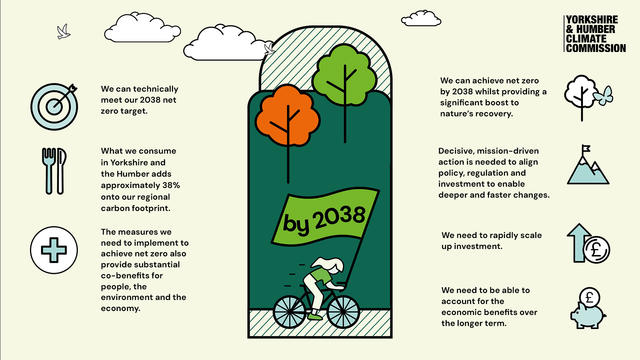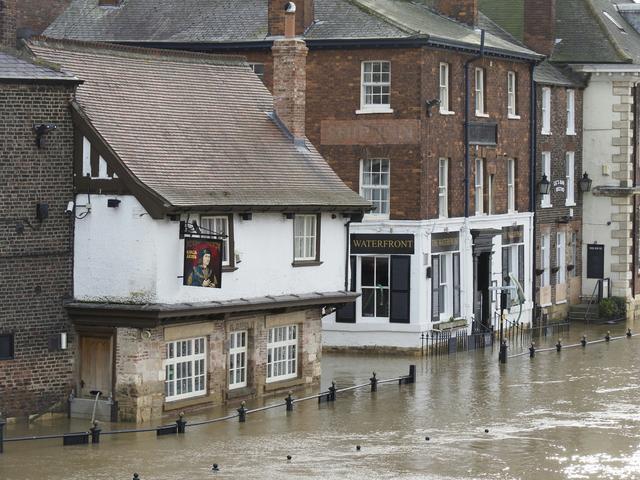Yorkshire and the Humber can reach net zero in 15 years, generating billions in co-benefits for people, nature, and the economy – according to a report by Yorkshire & Humber Climate Commission (a Y-PERN partner).
The region has an ambitious target to achieve net zero emissions by 2038, which can be achieved through ‘economically sound’ investments, more than a third of which pay for themselves.
As well as presenting clear and achievable pathways to net zero, a new report from Yorkshire & Humber Climate Commission reveals that consumption emissions add 38% to the regional carbon footprint. Emissions from transport and homes (especially the use of gas) account for almost half of these. Contributions from meat-eating, hobbies and pets, and aviation, among others, are also evaluated.
Our Carbon Story reveals £7.3bn will be needed annually to 2038, and that a longer-term view of economic benefits needs to be taken to evaluate paybacks. The figure equates to just under 3% of regional GDP; by 2038 this will be compensated for by the value of the energy savings alone.
If Yorkshire and the Humber seizes the opportunity, by 2050 (the national net zero target) the region will already have created a conservative £250bn in co-benefits, particularly from health and wellbeing. Changes within the transport sector offer the biggest opportunity for unlocking these co-benefits through interventions that are low-cost, financially attractive, and straightforward.
Emissions overall have halved since 1990, meaning the region must go four times faster between now and 2038 to reach net zero.
Reducing Yorkshire and the Humber’s carbon emissions can also provide big wins for nature, if done well. Biodiversity can be boosted by improving farming practices, changing some land use away from animal agriculture to broadleaf woodlands, and from protecting and restoring wetlands and peatlands.
The report calls for a ‘mission-driven’ approach to rapidly reduce emissions, scale up investment and enable deeper and faster changes.
“Accelerating delivery to achieve the 2038 target increases the urgency of upfront investment in some measures – but it will also allow the co-benefits and savings to take effect sooner,” said Rosa Foster, Director of the Yorkshire & Humber Climate Commission.
“It presents a perfect opportunity to unlock the potential of the region, so benefiting the UK economy as a whole.
“Our Carbon Story clearly demonstrates that it is both technically and economically feasible to achieve this regional net zero target. That strongly suggests that it is process, prioritisation, perspective, and governance that are the main barriers to realising our goal.
“The good news is that these are things within our gift to change. With the support of the Yorkshire & Humber Climate Commission, the region is ready and keen to work with the Government to deliver.
“If we do, our collective carbon story can still be a positive one.”
The report is underpinned by a carbon reduction assessment for Yorkshire and the Humber by independent academics, with research on consumption emissions by Dr Anne Owen of the University of Leeds.
Detailed sector briefings will be made available in the autumn, when the Commission will also be presenting the findings to MPs at Westminster for Parliamentary Evidence Week.
YPIP: Sustainable Living in a Greener Economy
The report also reveals that 87% of our emissions in Yorkshire and the Humber come from three sectors: industry (33%), transport (29%) and buildings (25%). Land use and agriculture emissions contribute a further 9%.
It goes on to say that retrofitting the region’s building stock is the single biggest area where investment is needed.
Notably this is key strand of YPIP (a project of Y-PERN), which brings together YHCC, the University of York’s Stockholm Environment Institute, Leeds Sustainability Institute and Leeds Beckett University. Working in tandem with community groups and policy makers, YPIP will examine how heritage buildings can meet Net Zero targets and be more energy efficient without damaging structures or impinging on their character. The work will initially be piloted in the City of York and in the rural areas of North Yorkshire, given the number of historical buildings in this part of the region, before being rolled out to other parts of Yorkshire and the Humber.




